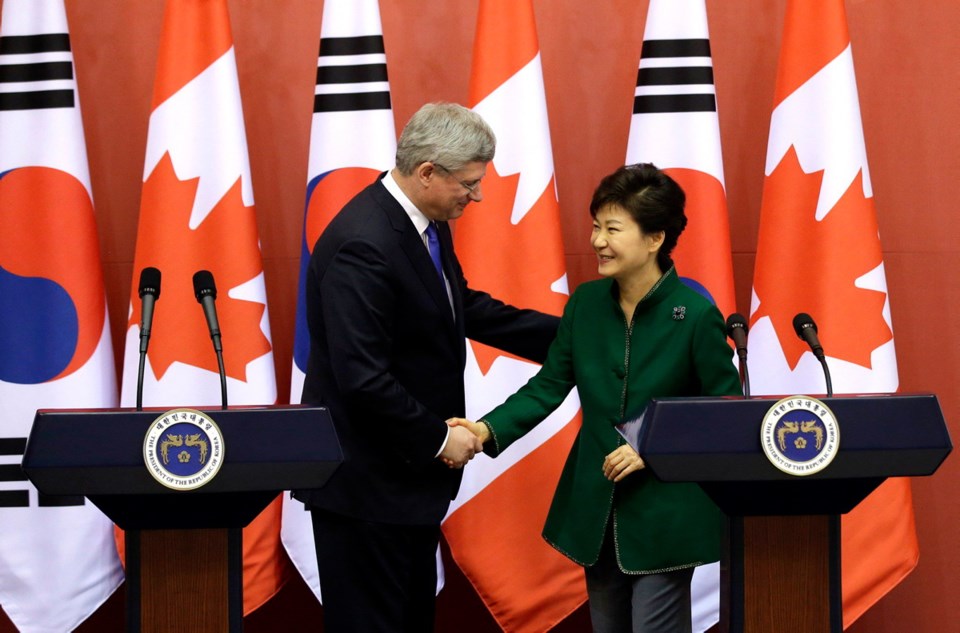OTTAWA — No one will ever again accuse Prime Minister Stephen Harper and his trade minister of not being able to land the big one.
After years of hooking minnows like Honduras, Panama and Jordan, Ottawa has not only concluded talks with the world’s biggest economy — the European Union — but also with South Korea, opening the door to the world’s most promising market.
The double-coup is sure to become a bragging point for the prime minister in next year’s expected election campaign — before the impact of the deals, good and bad, are felt in the economy.
The prime minister has placed expanding trade, along with balancing the budget, at the top of the government’s economic agenda and the Conservatives will likely be able to claim progress on both fronts by the fall of 2015.
The agreements also put the opposition — particularly the left-leaning New Democrats — in the unenviable position of either having to cheer “me too” or risk continuing to be portrayed as ideologically set against free trade, rather than a particular deal.
NDP trade critic Don Davies reserved judgment until the text of the South Korea deal is released, but blasted the government for an “utter lack of transparency,” and warned about possible damage to jobs in the auto sector.
The reaction from Liberal critic Chrystia Freeland was a bit more positive, saying the party was “broadly supportive,” but will need time to review the details.
Analysts say the South Korea deal, although it is far smaller in scope that the European agreement, has the potential of being transformative in Canada’s dealings with what is becoming the world’s most important and biggest economic regions.
By way of comparison, Ottawa estimates free trade with Europe will expand Canada’s gross domestic product output by $12 billion once fully implemented, as opposed to only $1.7 billion in the case of Korea.
But Ian Lee, of the Sprott School of Business at Carleton University, says Korea’s significance is strategic. “Now we’re in the major league,” he said. “I see South Korea not so much about the actual dollars of trade that’s involved, but it provides a beachhead into Asia and the Asian-Pacific countries that watch each other like a hawk. So it’s a very important precedent.”
Next on the menu for Harper and Trade Minister Ed Fast are Japan, India and the biggest prize — the TransPacific Partnership, which includes many of the region’s key economies.
Economically, trade deals don’t show their true colours until years have passed.
Most economists and business leaders believe the removal of artificial barriers is a general good for a country’s well being, as it forces domestic producers to become more efficient and competitive, while offering consumers lower prices and a wider variety of goods.
Labour groups, however, argue that the theory works only when the playing field is level. In most cases, they see free trade agreements resulting in jobs gravitating to low-wage jurisdictions.
HOW B.C. BENEFITS FROM SOUTH KOREA TRADE DEAL
South Korea is B.C.’s fourth-largest trading partner, with over 50 per cent of Canada’s exports to South Korea originating in this province. B.C. has also operated a Trade and Investment Representative Office in Seoul since 2008, and Premier Christy Clark led her second trade mission to South Korea last fall.
Here’s how B.C. stands to benefit from the new free-trade deal:
• Fish and seafood: B.C. now exports $8.1 million worth of fish and seafood to South Korea. Under the agreement, 70 per cent of fish and seafood products will be duty-free within five years, with all remaining duties eliminated within 12 years. Current duties on fish and seafood entering South Korea range up to 47 per cent, with average duties at 16.5 per cent.
• Mining: Ninety-eight per cent of tariffs on metals and minerals will be eliminated immediately, with remaining tariffs gone within five years. Duties are now up to eight per cent. Although coal is B.C.’s biggest mining export to South Korea, the trade deal won’t affect coal shipments because South Korea doesn’t charge any duties. In 2013, the value of copper ores and concentrates exported to South Korea totalled $183 million, while aluminum exports totalled $140 million.
• LNG: Liquefied natural gas, with duties now at three per cent, will be duty-free. After Japan, South Korea has the second-largest LNG industry in the world.
• Forestry: More than half (57 per cent) of forestry and value-added wood products will be duty-free under the agreement. Within three years, another 13 per cent will become duty-free. Current duties peak at 10 per cent, with an average of 2.9 per cent. B.C. averages $327.9 million in forestry exports to South Korea.
• Service sector: The agreement increases access to South Korea for B.C. professional-service providers (including those in the accounting, legal, environmental services, oil and gas, mining, clean energy, transportation and tourism sectors) by taking a “negative list” approach. That means unless they are specifically barred, B.C. service providers will have access to the South Korean market.
Source: B.C. Stats, B.C. Chamber of Commerce, B.C. Ministry of International Trade
— Vancouver Sun



